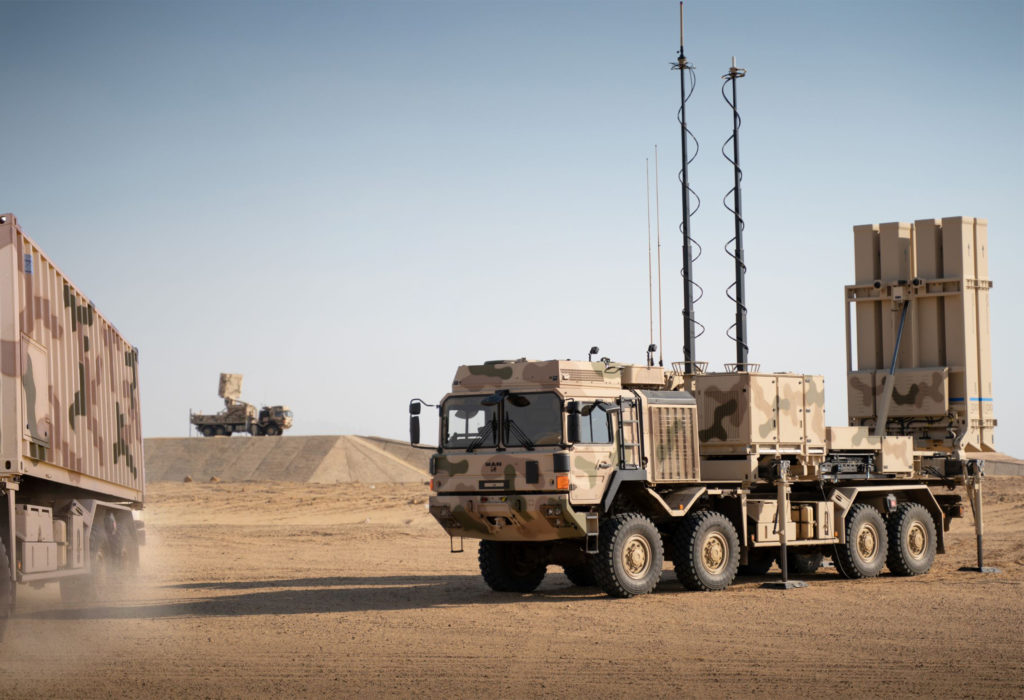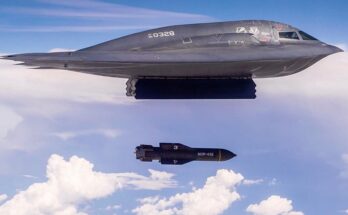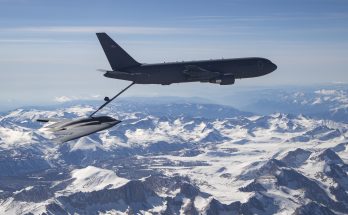
On Oct. 13, 2022, Germany and 14 NATO allies signed a non-binding letter of intent to pursue the European Sky Shield Initiative (ESSI), an integrated air-defense and anti-missile system. The initiative gained support from 19 European states as of July 2023. However, notable NATO members including France, Italy, Poland, Spain, and Turkey have refrained from joining.
German Chancellor Olaf Scholz proposed the ESSI in August 2022 following Russia’s invasion of Ukraine. The initiative builds on the 2014 Framework Nations Concept (FNC) led by Germany, the UK, and Italy. Scholz highlighted Europe’s vulnerability to ballistic and long-range missile threats, advocating for an integrated defense structure utilizing German IRIS-T, American Patriot, and Israeli Arrow-3 systems strategically positioned throughout Europe, with shared costs among participants.
German Motivation
Chancellor Scholz’s announcement in the Bundestag (German federal parliament) on Feb. 27, 2022, marked a significant shift in Germany’s defense strategy post the Russian invasion. Dubbed the “Zeitenwende” (historical turning point) speech, it committed Berlin to a 100 billion euro military modernization fund and adopted the NATO standard 2% GDP defense spending requirement—measures historically at odds with Scholz’s Social Democratic Party.
German leadership of the ESSI is primarily driven by economic and security concerns. Germany’s aspiration to bolster defense exports is demonstrated by the successful promotion of its IRIS-T system. In 2023 alone, Germany secured significant revenue, with major deals involving countries such as Saudi Arabia, Estonia, Latvia, and Greece.
Beyond economic gains, Germany seeks to assert itself as a leader in both NATO and European defense, a strategic move aimed at enhancing its geopolitical influence. Notable political shifts, including the approval of Eurofighter aircraft equipped with IRIS-T missiles for sale to Saudi Arabia after years of blockade and Germany’s superseding the U.S. as Estonia’s principal defense partner through a substantial $1 billion sale of IRIS-T systems, underscores its commitment to shaping international defense dynamics.
The Need For Integrated Defense
Current European defense relies on two Aegis Ashore batteries in Romania and Poland, along with mobile Aegis systems on five ARLEIGH BURKE-class destroyers stationed by the US Navy in Rota, Spain, and soon in Alexandroupoli, Greece. The current posture is lacking in medium and long-range defensive capabilities and limits the scope of European participation.
Coordinated air defense through the ESSI serves to facilitate the replacement of older systems with cost-effective, interoperable and more advanced solutions to defend against air threats in the face of an evolving geopolitical environment.
Gaps In German Leadership
Germany aims to integrate the ESSI into NATO’s Integrated Air and Missile Defense (IAMD). The IAMD is primarily concerned with countering threats outside the Euro-Atlantic area, specifically Iran – the ESSI, however, has made Russia a clear enemy. This divide is further deepened by the inclusion of the Arrow 3 system, whose extended range is seen as a clear threat to Russia. Despite NATO’s assurance that IAMD isn’t aimed at Russia, ESSI explicitly addresses the Russian threat, raising issues of posture compatibility among participants.
Germany faces challenges in reconciling the conflicting interests of participating states, partly due to its limited capacity to navigate years of European mistrust. Notably, the United Kingdom and Turkey prioritize NATO interests over those of the E.U., pointing to a difficult divide in deterrence priorities.
For decades, Germany consistently failed to meet the alliance’s agreed-upon goal of allocating 2% of its GDP to defense. Additionally, Germany’s limited engagement in international military missions has sparked concerns among NATO members regarding its commitment to collective defense efforts. Having assumed a more passive role in European defense planning over the last few decades, Germany may face challenges in fostering the necessary cooperation solely through its prestige.
Another leadership gap stems from France’s refusal to participate in the ESSI. France, under the leadership of President Emmanuel Macron, has criticized the ESSI for its heavy reliance on non-European systems, specifically the U.S. Patriot system and Israel’s Arrow-3, for medium and long-range interception. Macron’s concerns center around the potential threat to European strategic autonomy as well as the ESSI’s criticism of the French-Italian SAMP/T air defense system, which it has since upgraded to meet the ESSI requirements.
France advocates for European industrial protectionism, urging nations to prioritize homegrown defense systems and limit reliance on non-European alternatives. This marks a divergence in perspectives within NATO, where participants historically seek interoperable and readily available equipment, an area where Europe has struggled to keep pace with the U.S.
Additionally, several nations prefer bilateral defense agreements over a multilateral initiative. Poland and Spain, for example, are developing bilateral air defense programs with the United States and the United Kingdom. Poland signed a US$13.7 billion deal with South Korea in May 2022, Seoul’s biggest defense deal ever, for the purchase of Chunmoo rocket launchers, K2 tanks, K9 self-propelled howitzers, and FA-50 fighter aircraft, signaling its weakened faith in European turnaround.
Summary
Germany’s pursuit of leadership through the European Sky Shield Initiative (ESSI) reflects a significant shift in defense strategy following Russia’s invasion of Ukraine. Propelled by Chancellor Olaf Scholz, the ESSI addresses Europe’s vulnerability to missile threats and seeks to rapidly resolve the issues through integrated defense using German, American, and Israeli systems. Germany’s motives extend beyond economic gains, seeking to assert itself as a leader in NATO and European defense, evident in the success of the IRIS-T system and historic milestones like the approval of Eurofighter aircraft sales. These moves by Germany’s Social Democratic Party have paved the road for new German leadership, but may not be enough to overcome decades of passivity and inspire European cooperation across the board.
Sources:
- Arnold, Sven, and Torben Arnold. Germany’s Fragile Leadership Role in European Air Defence, 6 Feb. 2023, www.swp-berlin.org/publications/products/comments/2023C06_EuropeanSkyShieldInitiative.pdf
- Bosen, Ralf. “Sky Shield Initiative: Can It Protect Europe? – DW – 09/28/2023.” Dw.Com, Deutsche Welle, 28 Sept. 2023, www.dw.com/en/sky-shield-initiative-can-it-protect-europe/a-66900967
- Lee, Joyce, and Joshua Smith. “Insight: Inside South Korea’s Race to Become One of the World’s Biggest …” Reuters, 29 May 2023, www.reuters.com/business/aerospace-defense/inside-south-koreas-race-become-one-worlds-biggest-arms-dealers-2023-05-29/
- “Poland – Integrated Air and Missile Defense (IAMD) Battle Command System (IBCS).” Poland – Integrated Air and Missile Defense (IAMD) Battle Command System (IBCS) | Defense Security Cooperation Agency, Defense Security Cooperation Agency, 28 June 2023, www.dsca.mil/press-media/major-arms-sales/poland-integrated-air-and-missile-defense-iamd-battle-command-system-0
- Presse, AFP – Agence France. “Estonia, Latvia Acquire 1bn-Euro German Air Defence System.” Barron’s, Barrons, 11 Sept. 2023, www.barrons.com/news/estonia-latvia-acquire-1bn-euro-german-air-defence-system-ced09491
- Scholz, Olaf. “Policy Statement by Olaf Scholz, Chancellor of the Federal Republic of Germany and Member of the German Bundestag, 27 February 2022 in Berlin.” Bundesregierung, 27 Feb. 2022, www.bundesregierung.de/breg-en/news/policy-statement-by-olaf-scholz-chancellor-of-the-federal-republic-of-germany-and-member-of-the-german-bundestag-27-february-2022-in-berlin-2008378
- Siebold, Sabine, and Rachel More. “Germany to Resume Arms Deliveries to Saudi Arabia with Iris-T Missiles.” Reuters, 10 Jan. 2024, news.yahoo.com/germany-resume-arms-deliveries-saudi-130659173.html
- Siebold, Sabine. “Germany Pledges to Make Its Military ’the Backbone of Defence in Europe …” Reuters, 9 Nov. 2023, www.reuters.com/world/europe/germany-pledges-make-its-military-the-backbone-defence-europe-2023-11-09/
- “Spain – Patriot Configuration-3+ Modernized Fire Units.” Spain – PATRIOT Configuration-3+ Modernized Fire Units | Defense Security Cooperation Agency, Defense Security Cooperation Agency, www.dsca.mil/press-media/major-arms-sales/spain-patriot-configuration-3-modernized-fire-units. Accessed 18 Jan. 2024
Aja Melville is an accomplished editor and analyst with expertise in open-source intelligence (OSINT) and database management. As the Weapons Editor and Analyst at Military Periscope, Aja has applied her analytical skills and in-depth knowledge in military affairs and global defense sector advancements, particularly focusing on China and the Asia-Pacific region.
Aja's commitment to international relations and Asia-Pacific focus is highlighted by her educational background. She holds a Bachelor of Arts in International Relations and Chinese Language from Bard College, complemented by a Certificate of Advanced International Studies from the Bard Globalization and International Affairs Program. Aja further expanded her linguistic skills with a Certificate of Intensive Language Studies in Chinese (Mandarin) from Qingdao University.




